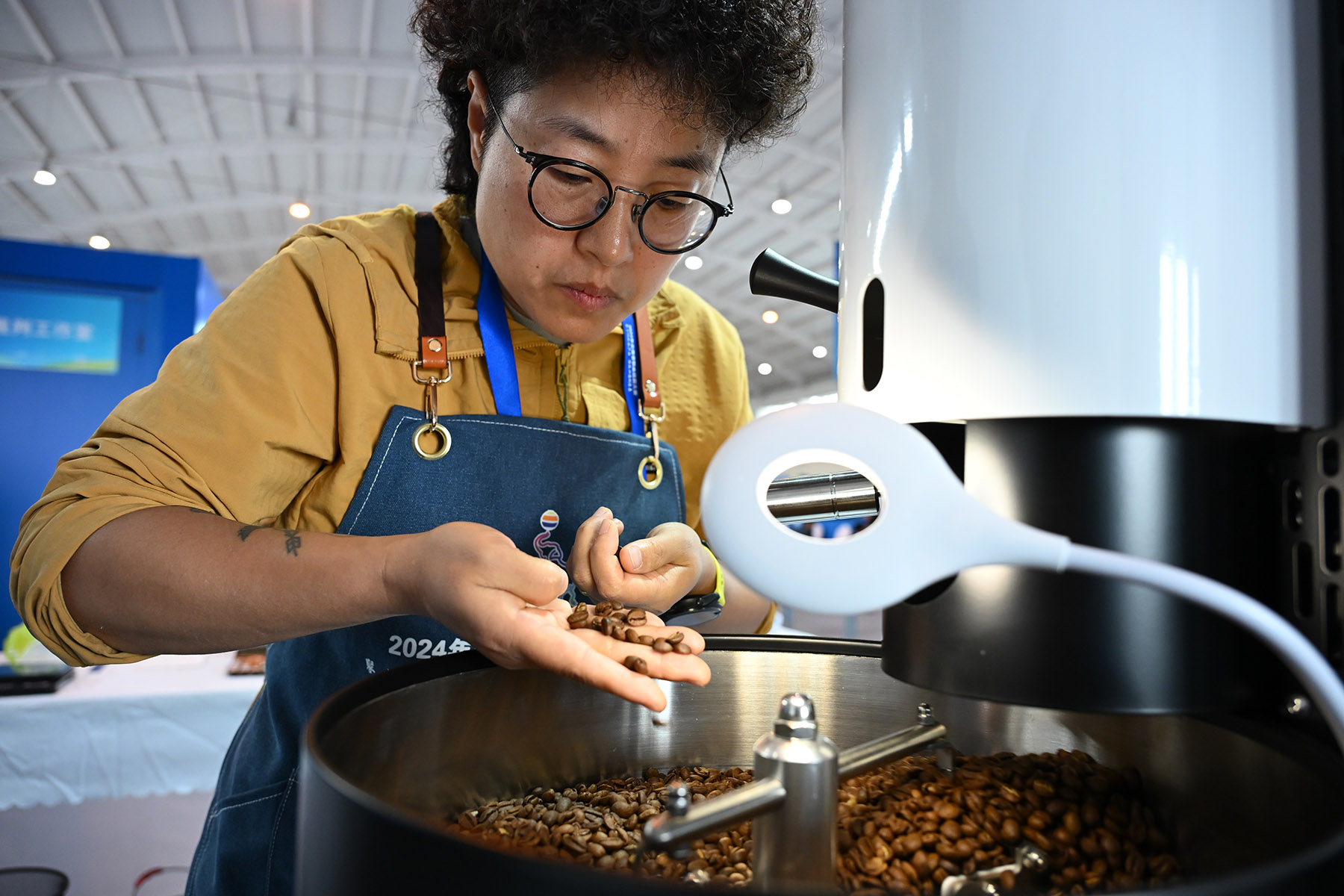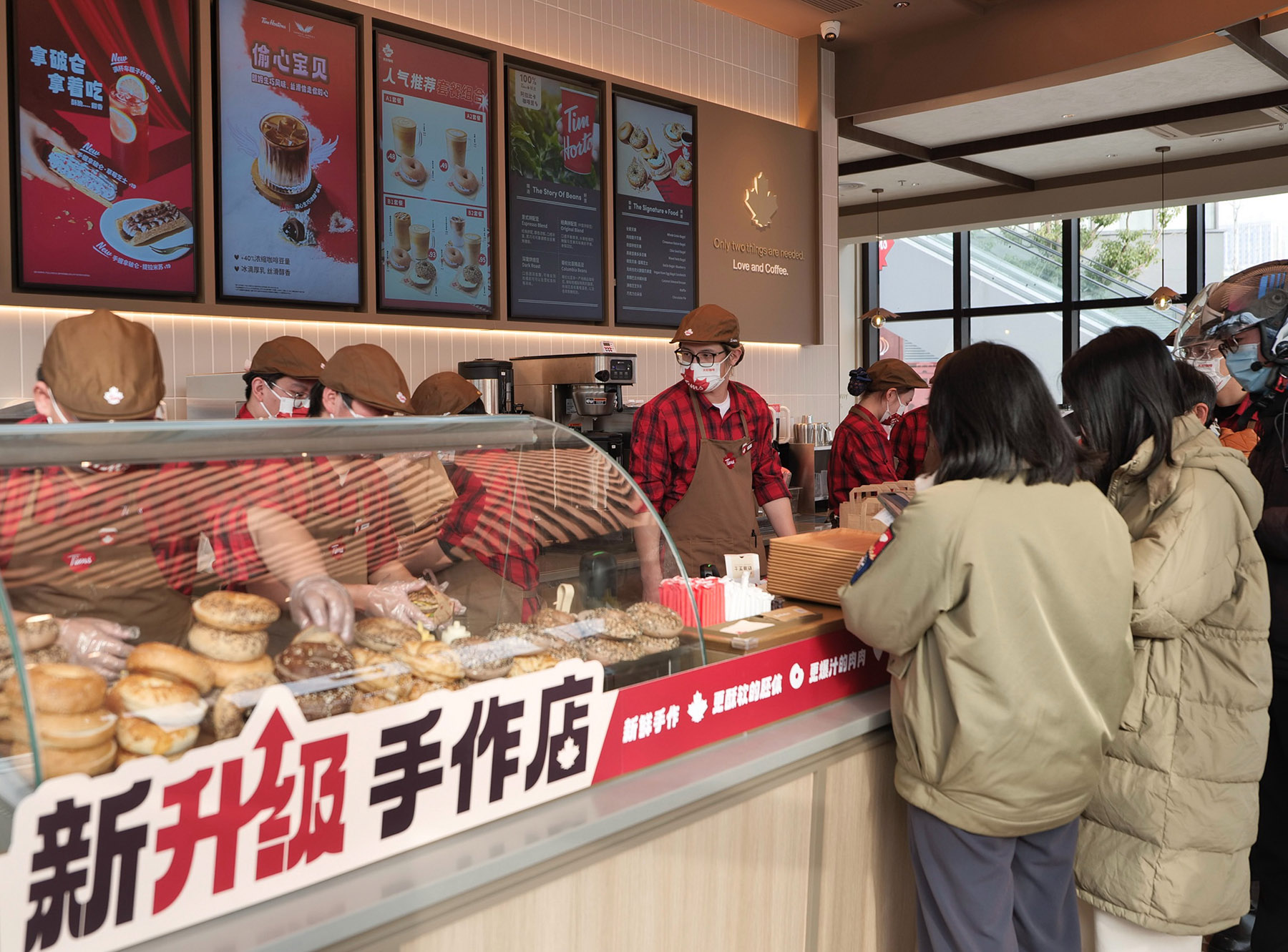Partnerships with retailers, investing in supply chains to support faster outlet expansion

Major players in China's growing coffee market are pivoting their strategies in order to stay competitive.
Shifting away from price-focused tactics to a quality-driven approach, brands like Cotti Coffee, Luckin Coffee, Tims China and Starbucks are finding unique ways to capture market share in a rapidly expanding sector.
The World Federation of Chinese Catering Industry recently released its "China Coffee Industry Report 2024", highlighting the robust growth of the nation's coffee market and its shifting consumption patterns.
READ MORE: Aroma of Yunnan beans attracts coffee lovers in metropolis
Coffee cultivation in China is centered in Yunnan province, producing just over 100,000 metric tons annually. However, with demand outstripping domestic supply, coffee imports saw a 20 percent year-on-year growth in 2023, totaling 150,000 tons valued at nearly 6 billion yuan ($840.6 million).
According to the report, China's coffee consumption has surged by 167 percent over the past decade, reaching 350,000 tons. Freshly ground and retail coffee has emerged as leading categories, with freshly ground coffee accounting for a market value of over 120 billion yuan and the total coffee market exceeding 150 billion yuan.
This growth aligns with an increasing shift toward freshly ground coffee, which is expected to rise from a 40 percent market share to over 80 percent in the near future.
Cotti Coffee, one of the fastest-growing coffee chains in China, recently announced an ambitious expansion plan to operate 50,000 stores by 2025, up from the current 10,000.
To reach this milestone, the chain aims to open 40,000 new locations within the next 18 months. This massive scale-up depends heavily on collaborations with 51 local retailers and catering partners, including convenience store operator Meiyijia, which had operated more than 33,000 chain stores in the country by 2023, burger and chicken restaurant chain Wallace, electronics store Suning, and budget hospitality chain Home Inn.
These partners bring more than 100,000 retail locations across the country into the fold, helping Cotti gain significant reach in both urban and rural markets.
In addition to partnerships, Cotti Coffee is investing in its supply chain infrastructure to support this rapid expansion. The company is building factories and enhancing store operations systems to ensure scalability and consistent service quality.
According to CEO Li Yingbo, Cotti plans to stick with its low-price strategy for at least three years, hoping to capture a larger share of the Chinese market by appealing to budget-conscious consumers.
"The 9.9 yuan strategy will remain at least for three years," Li told Foodic, a food and beverage sector portal.
However, Cotti stands nearly alone in embracing this low-cost model even as other brands shift toward a quality-first approach.
This shift underscores the difficulty of sustaining profit margins through low pricing alone, especially given the high operational costs associated with coffee production and retail.
"The low-price strategy is difficult for coffee companies to sustain. Without profits, there's no room for service, innovation, or customer engagement, which ultimately means no sales or margins," said Zhu Danpeng, an independent food and beverage analyst.
Luckin Coffee, once known for its aggressive pricing, is now moving toward quality-focused operations.
The company quickly captured market attention with quality coffee priced at 9.9 yuan, significantly below market rates. This strategy helped Luckin become one of China's largest coffee chains, with "cheap and delicious" becoming a catchphrase among consumers.

However, as Luckin's footprint grew and market competition intensified, the brand started feeling the financial strain of its low-price model.
Luckin's second quarter financial results highlighted these changes. Net revenue reached 8.403 billion yuan, marking a 35.5 percent increase year-on-year.
However, the brand faced challenges with a same-store sales decline of 20.9 percent for self-operated stores. This reflects the impact of shifting away from a low-price strategy in an increasingly competitive market.
Realizing that price cuts could only drive growth for so long, Luckin has begun to scale back on its low-price promotions. Instead, the company is refining its supply chain and quality control to position itself as a high-quality, value-driven brand.
To support this transition, Luckin has invested heavily in its sourcing network.
In July 2024, it opened its 20,000th store in Beijing. The company sources coffee beans from top-producing regions worldwide, including Brazil, Ethiopia and Yunnan, ensuring that customers receive a consistent and high-quality product.
In June, Luckin signed agreements to purchase 120,000 tons of coffee beans from Brazil through 2025.
Luckin has also strengthened its processing capabilities, with a Green Coffee Bean Processing Plant in Baoshan, Yunnan, and roasting plants in Jiangsu and Fujian provinces that give it an annual roasting capacity of 45,000 tons. With a 3 billion yuan investment in a new Innovation and Production Center in Qingdao, Shandong province, Luckin plans to further expand its roasting capacity to 55,000 tons, integrating its supply chain to fuel long-term growth.
While Luckin and Cotti rely on rapid expansion, Tims China has opted to stay out of the pricing battle, focusing instead on quality and value-driven combo offers. With 907 stores across 71 cities, Tims China provides a value proposition through set meal offerings that combine coffee with freshly prepared food, said the company.
"We offer a high-value product with every meal, creating an edge in a crowded market," said CEO Lu Yongchen. "We prioritize quality over quantity, building our brand without blindly chasing expansion."
Tims China had attracted 21.4 million members as of its second-quarter results. Lu said that Tims will not follow the industry's "involution", or the race to the bottom on pricing, instead focusing on sustainability and quality for long-term success.
As the coffee industry leader in China, Starbucks has embraced local partnerships and sustainability initiatives to strengthen its brand.
According to its preliminary fourth quarter results, China comparable store sales declined 14 percent, driven by an 8 percent decline in average ticket, compounded by a 6 percent decline in comparable transactions, weighed down by intensified competition and a soft macro environment that impacted consumer spending.
"Our fourth quarter performance makes it clear that we need to fundamentally change our strategy so we can get back to growth and that's exactly what we are doing with our 'Back to Starbucks' plan," said Brian Niccol, chairman and chief executive officer.
Its efforts to gain more customers in China have been intensified with its expansion into university campuses, including new stores in Fudan University in Shanghai, University of International Business and Economics in Beijing and Guangzhou College of Commerce.
The company aims to operate 9,000 stores across 300 cities by 2025, a goal that aligns with its broader strategy of supporting China's coffee-growing regions and creating new jobs.
ALSO READ: Coffee shops brew new growth with tea drinks
Recently, Starbucks enhanced its local supply chain with a supplier convention in Yunnan. Around 1,500 coffee bean growers attended the event, where Starbucks China CEO Liu Wenjuan announced that every cup of Starbucks classic espresso coffee sold on the Chinese mainland would be made from Yunnan-grown beans.
This partnership reflects Starbucks' commitment to sustainability and quality. The company's Farmer Support Center in Pu'er, Yunnan, has been operating for over a decade, training over 36,800 farmers and certifying 3,411 farms through its C.A.F.E. Practices, a program aimed at responsible sourcing. Over the past 12 years, Starbucks has purchased more than 65,000 tons of coffee from Yunnan.
Starbucks is also focusing on leadership to drive growth, with Molly Liu, or Liu Wenjuan, recently promoted to global executive vice-president and co-CEO of Starbucks China. Under her leadership, the company continues to innovate in store management, quality control, and customer experience. Chairwoman and CEO Belinda Wong, who has led Starbucks China's growth since 2011, remains at the helm, aiming to create over 10,000 jobs annually by 2025.
"As these brands redefine their strategies, China's coffee market is evolving from a battleground of low prices to a space where quality, brand reputation and innovation are becoming increasingly important," said Zhu, the analyst. "The overall number of coffee consumers is ever expanding, contributing to a more diversified and dynamic coffee experience."


